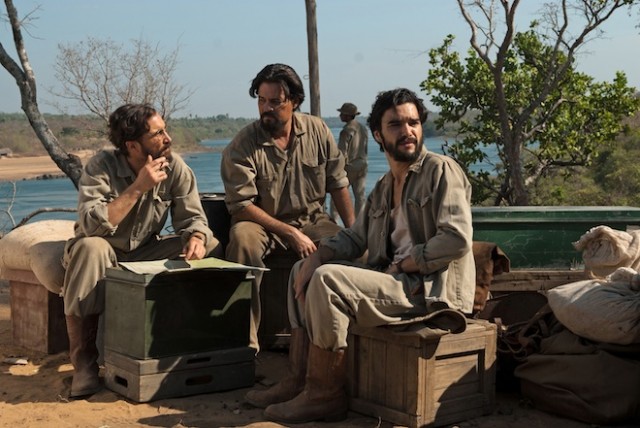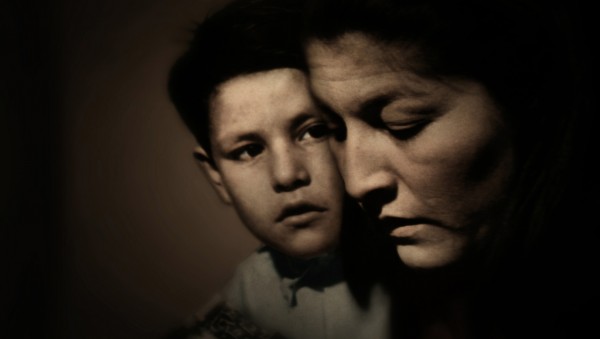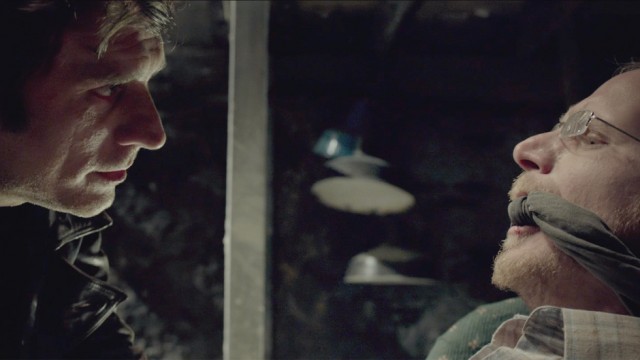
THE INVISIBLE FRONT focuses on Lithuanian resistance movement of the 1940s against Soviet aggression
THE INVISIBLE FRONT: A STORY OF THE LITHUANIAN UNDERGROUND RESISTANCE AGAINST SOVIET OPPRESSION (Vincas Sruoginis & Jonas Ohman, 2013)
Cinema Village
22 East 12th St. between University Pl. & Fifth Ave.
Opens Friday, November 7
212-924-3363
www.cinemavillage.com
www.theinvisiblefront.com
 In The Invisible Front, directors Vincas Sruoginis and Jonaš Ohman and producer Mark Johnston tell the story of the little-known Lithuanian resistance movement against the Soviets beginning in the early 1940s, as Stalin sought to spread his communist rule by invading Lithuania, Latvia, and Estonia. The central focus is on the heroic Juozas Lukša, whose memoir, Forest Brothers: The Account of an Anti-Soviet Lithuanian Freedom Fighter, 1944-1948, is quoted extensively in the film. Using news reports, archival footage, and new interviews with surviving partisans, Soviet collaborators, and former Lithuanian president Valdas Adamkus, Sruoginis and Ohman relate the devastating tale of the 1940s resistance, celebrating the enduring spirit of the Lithuanian freedom movement, including the battle for independence in 1991. Unfortunately, the tale gets drowned in sentiment and propaganda, with dry narration and melodramatic music. Of course, the story is as relevant as ever as Vladimir Putin and the Russians again threaten to wreak havoc in the region, but the film is more a call-to-arms than a historical investigation. In fact, the filmmakers are raising money for the current Ukraine resistance; it might be a noble cause, but that purpose further marks the film as having too much of an agenda. The Invisible Front opens November 7 at Cinema Village, with Sruoginis, Ohman, and Johnston participating in Q&As following the 7:00 screenings on Friday and Saturday and the 1:00 show on Sunday.
In The Invisible Front, directors Vincas Sruoginis and Jonaš Ohman and producer Mark Johnston tell the story of the little-known Lithuanian resistance movement against the Soviets beginning in the early 1940s, as Stalin sought to spread his communist rule by invading Lithuania, Latvia, and Estonia. The central focus is on the heroic Juozas Lukša, whose memoir, Forest Brothers: The Account of an Anti-Soviet Lithuanian Freedom Fighter, 1944-1948, is quoted extensively in the film. Using news reports, archival footage, and new interviews with surviving partisans, Soviet collaborators, and former Lithuanian president Valdas Adamkus, Sruoginis and Ohman relate the devastating tale of the 1940s resistance, celebrating the enduring spirit of the Lithuanian freedom movement, including the battle for independence in 1991. Unfortunately, the tale gets drowned in sentiment and propaganda, with dry narration and melodramatic music. Of course, the story is as relevant as ever as Vladimir Putin and the Russians again threaten to wreak havoc in the region, but the film is more a call-to-arms than a historical investigation. In fact, the filmmakers are raising money for the current Ukraine resistance; it might be a noble cause, but that purpose further marks the film as having too much of an agenda. The Invisible Front opens November 7 at Cinema Village, with Sruoginis, Ohman, and Johnston participating in Q&As following the 7:00 screenings on Friday and Saturday and the 1:00 show on Sunday.

 In 2012, a fierce battle over the legalization of marijuana took place in Washington State, but it turned out that the most intense fighting was not between Democrats and Republicans, liberals and conservatives, or even drug users and the “Just Say No” contingent. Instead, the controversial Initiative 502 pit medical marijuana users and purveyors against a dedicated group of men and women from across the spectrum who believed that I-502 was a necessary first step in the decriminalization of pot. Producer-director Riley Morton and producer-writer Nils Cowan take viewers behind the scenes of the hotly contested campaign in Evergreen: The Road to Legalization. The pro-I-502 group is spearheaded by ACLU drug policy director Alison Holcomb; such current and former U.S. and city attorneys as John McKay and Pete Holmes; state representative Mary Lou Dickerson; travel writer and television host Rick Steves; and substance abuse specialist Dr. Roger Roffman, who says that I-502 “not only tightly regulates where marijuana is produced and how it’s sold and to whom it’s sold; it also creates, through earmarking, programs for education and prevention and treatment and research. All of this amounts to a public health alternative to prohibition.” On the other side are Cannibis Action Coalition executive director Steve Sarich, 4Evergreen Group cofounders Josh Berman and Ramel Williams, Seattle Hempfest director Vivian McPeak, former medical marijuana dispensary owner Julie Istvan, Snohomish County Drug & Gang Task Force commander Pat Slack, and, most vehemently, defense attorney and activist Doug Hiatt, who claims, “The entire thing is about getting a win, getting this first victory so you can trumpet it and say it even if it’s just a propaganda victory.” The central issue concerns the initiative’s effect on the medical marijuana industry, both sellers and users, including a heated debate over a DUI provision that reaches a pinnacle when a group against I-502 attempts to shout down a “Vote Yes” rally in the state capitol in Olympia. Morton’s feature-length debut is a compelling look inside not only the war on drugs but the grueling process of civic reform in today’s culture, a primer on how difficult it is to institute real change in contemporary America.
In 2012, a fierce battle over the legalization of marijuana took place in Washington State, but it turned out that the most intense fighting was not between Democrats and Republicans, liberals and conservatives, or even drug users and the “Just Say No” contingent. Instead, the controversial Initiative 502 pit medical marijuana users and purveyors against a dedicated group of men and women from across the spectrum who believed that I-502 was a necessary first step in the decriminalization of pot. Producer-director Riley Morton and producer-writer Nils Cowan take viewers behind the scenes of the hotly contested campaign in Evergreen: The Road to Legalization. The pro-I-502 group is spearheaded by ACLU drug policy director Alison Holcomb; such current and former U.S. and city attorneys as John McKay and Pete Holmes; state representative Mary Lou Dickerson; travel writer and television host Rick Steves; and substance abuse specialist Dr. Roger Roffman, who says that I-502 “not only tightly regulates where marijuana is produced and how it’s sold and to whom it’s sold; it also creates, through earmarking, programs for education and prevention and treatment and research. All of this amounts to a public health alternative to prohibition.” On the other side are Cannibis Action Coalition executive director Steve Sarich, 4Evergreen Group cofounders Josh Berman and Ramel Williams, Seattle Hempfest director Vivian McPeak, former medical marijuana dispensary owner Julie Istvan, Snohomish County Drug & Gang Task Force commander Pat Slack, and, most vehemently, defense attorney and activist Doug Hiatt, who claims, “The entire thing is about getting a win, getting this first victory so you can trumpet it and say it even if it’s just a propaganda victory.” The central issue concerns the initiative’s effect on the medical marijuana industry, both sellers and users, including a heated debate over a DUI provision that reaches a pinnacle when a group against I-502 attempts to shout down a “Vote Yes” rally in the state capitol in Olympia. Morton’s feature-length debut is a compelling look inside not only the war on drugs but the grueling process of civic reform in today’s culture, a primer on how difficult it is to institute real change in contemporary America.




 Israeli film critic Aharon Keshales and his former student Navot Papushado follow up their 2011 Israeli slasher flick, Rabies, with the gory, ultraviolent black-comedy thriller Big Bad Wolves. Award-winning actor Lior Ashkenazi stars as Miki, a cop who is sure that Bible teacher Dror (Rotem Keinan) is behind the grisly kidnap, rape, and murder of a young girl. Miki and his partner, Rami (Menashe Noy), and two thugs try to beat the truth out of Dror, against the direct orders of their commanding officer, Zvika (Dvir Benedek). When the illegal interrogation winds up on YouTube, Miki is relieved of duty — with Zvika’s blessing to continue to go after Dror. But when Gidi (Tzahi Grad), the father of the dead girl, joins the chase, things threaten to get out of control — and quickly become even crazier. Big Bad Wolves is a sly, smart take on such genre pictures as Oldboy, Se7en, and Quentin Tarantino’s Reservoir Dogs, Pulp Fiction, and Inglourious Basterds, featuring generous amounts of brutal torture along with some very funny bits involving Jewish mothers. Writer-directors Keshales and Papushado keep the audience guessing right up to the very end as the main characters rarely do what is expected and hysterical comic scenes show up at rather inopportune moments. While playing with the standard elements of the revenge flick and the cop-on-the-edge tale, the dark, atmospheric Big Bad Wolves also explores the unbreakable bond between parents and children, lending more than a touch of gravitas to the wild, unpredictable proceedings, which are not for the faint of heart.
Israeli film critic Aharon Keshales and his former student Navot Papushado follow up their 2011 Israeli slasher flick, Rabies, with the gory, ultraviolent black-comedy thriller Big Bad Wolves. Award-winning actor Lior Ashkenazi stars as Miki, a cop who is sure that Bible teacher Dror (Rotem Keinan) is behind the grisly kidnap, rape, and murder of a young girl. Miki and his partner, Rami (Menashe Noy), and two thugs try to beat the truth out of Dror, against the direct orders of their commanding officer, Zvika (Dvir Benedek). When the illegal interrogation winds up on YouTube, Miki is relieved of duty — with Zvika’s blessing to continue to go after Dror. But when Gidi (Tzahi Grad), the father of the dead girl, joins the chase, things threaten to get out of control — and quickly become even crazier. Big Bad Wolves is a sly, smart take on such genre pictures as Oldboy, Se7en, and Quentin Tarantino’s Reservoir Dogs, Pulp Fiction, and Inglourious Basterds, featuring generous amounts of brutal torture along with some very funny bits involving Jewish mothers. Writer-directors Keshales and Papushado keep the audience guessing right up to the very end as the main characters rarely do what is expected and hysterical comic scenes show up at rather inopportune moments. While playing with the standard elements of the revenge flick and the cop-on-the-edge tale, the dark, atmospheric Big Bad Wolves also explores the unbreakable bond between parents and children, lending more than a touch of gravitas to the wild, unpredictable proceedings, which are not for the faint of heart.